To shed some additional light on the jobs report.
By Wolf Richter for WOLF STREET.
Earlier today, we looked at the overall job market: Landing Still Cancelled: Labor Market Cruises through Updrafts and Air Pockets. Now we’ll look at it by industry classification over the longer term, because there are huge variations, with some industries shedding lots of jobs, and other piling them on, and others again just hanging on to whoever they already have.
Professional and business services, the largest industry sector by employment with many highly-paid jobs; it includes Professional, Scientific, and Technical Services; Management of Companies and Enterprises; Administrative and Support, and Waste Management and Remediation Services. Some of the tech companies are included, others are in “Information” or in other categories.
- Total employment: 23.1 million
- June, month-to-month: +21,000
- Three-month: +154,000
- Six-month: +240,000
- Growth since Feb 2020: +1.62 million
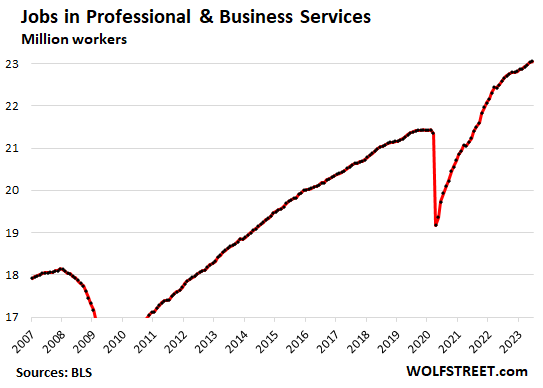
“Information” is a small sector that includes web search portals, data processing, data transmission, information services, software publishing, motion picture and sound recording, broadcasting including over the Internet, and telecommunications.
Some of the tech and social media companies with big layoff announcements are in this industry classification.
This industry saw a huge hiring boom in 2021 through late 2022 that then suddenly turned south, with employment dropping for a couple of months. But so far this year, employment has stabilized, with some companies shedding jobs and other companies adding jobs.
- Total employment: 3.1 million
- June, month-to-month: 0
- Three-month: +3,000
- Six-month: -25,000
- Growth since Feb 2020: +187,000
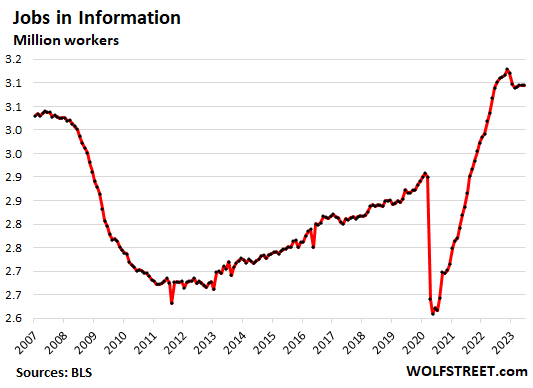
Healthcare and social assistance: second largest sector in terms of employment.
- Total employment: 21.4 million
- June, month-to-month: +65,200
- Three-month: +197,000
- Six-month: +385,000
- Growth since Feb 2020: +577,000
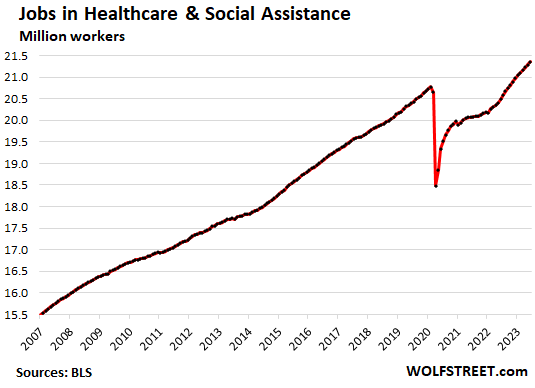
State & local government – includes education, where institutions in many locations are still struggling with teacher shortages; employment is still below February 2020 levels, with a record 959,000 job openings in May, up by 69% from the same period in 2019.
- Total employment: 19.8 million
- June, month-to-month: +59,000
- Three-month: +137,000
- Six-month: +339,000
- Growth since Feb 2020: -220,000
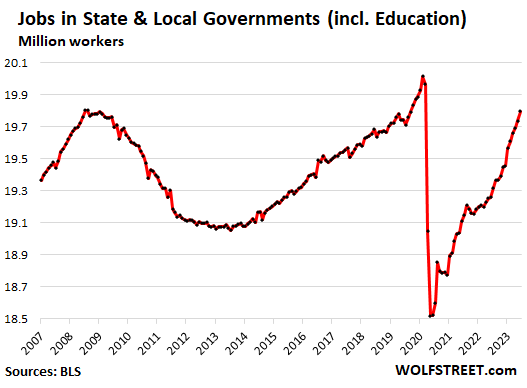
Leisure and hospitality – restaurants, lodging, etc. – has had trouble competing for employees. The industry still has 1.35 million job openings, and and the level of employment still hasn’t caught up with the levels before the pandemic.
- Total employment: 16.6 million
- June, month-to-month: +21,000
- Three-month: +58,000
- Six-month: +260,000
- Growth since Feb 2020: -369,000
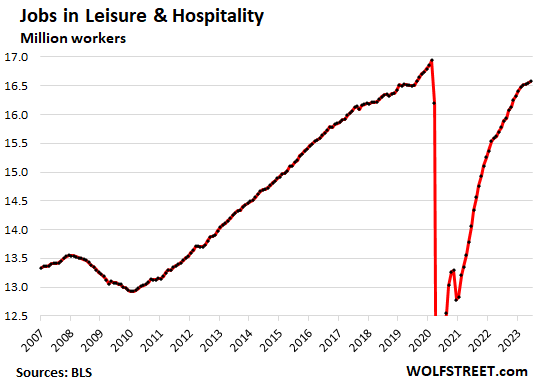
Retail trade includes workers at brick-and-mortar retail stores and other retail locations. It does not include the office employees at ecommerce operations, drivers, fulfillment center employees, etc. The mall-portion of this sector has come under heavy pressure from ecommerce operations.
- Total employment: 15.5 million
- June, month-to-month: -11,200
- Three-month: +10,000
- Six-month: +61,000
- Growth since Feb 2020: +19,000
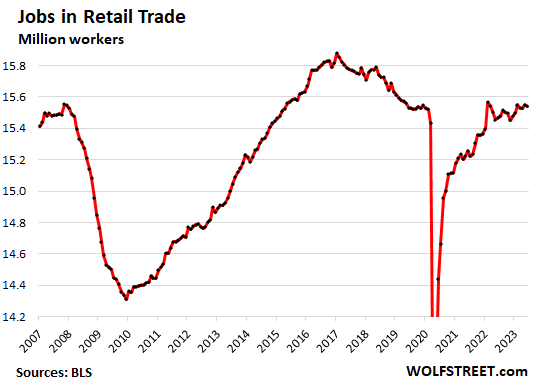
Manufacturing: After strong bounce off the pandemic lows, job growth has leveled off at a higher level than in 2019.
- Total employment: 13.0 million
- June, month-to-month: +7,000
- Three-month: +13,000
- Six-month: +15,000
- Growth since Feb 2020: +204,000
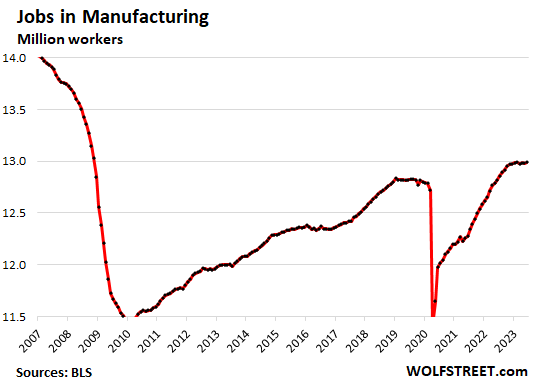
Construction – all types of construction, from single-family housing to highways:
- Total employment: 7.9 million
- June, month-to-month: +23,000
- Three-month: +57,000
- Six-month: +88,000
- Growth since Feb 2020: +323,000
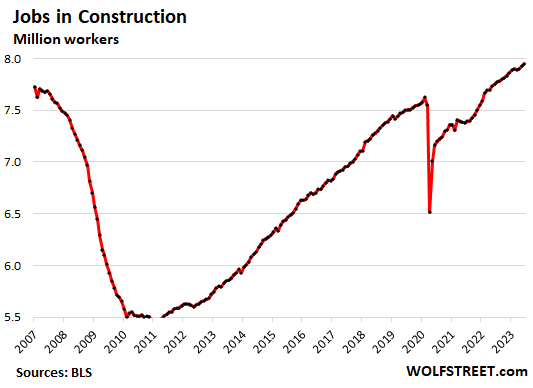
Finance & Insurance:
- Total employment: 6.7 million
- June, month-to-month: +6,700
- Three-month: +36,400
- Six-month: +30,300
- Growth since Feb 2020: +218,000
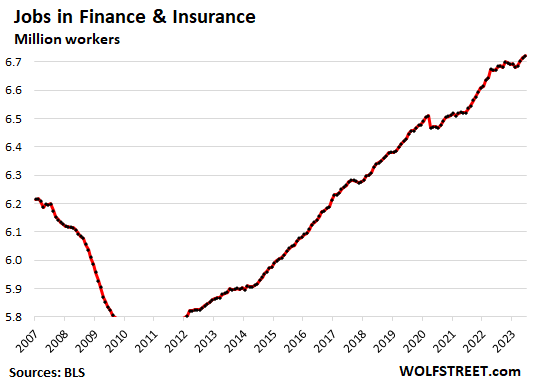
Transportation and Warehousing:
- Total employment: 6.73 million
- June, month-to-month: -6,900
- Three-month: -5,100
- Six-month: +25,100
- Growth since Feb 2020: +944,000
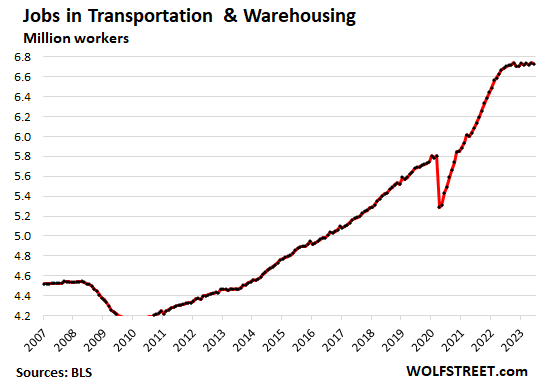
Wholesale Trade:
- Total employment: 6.05 million
- June, month-to-month: -3,600
- Three-month: -900
- Six-month: +18,200
- Growth since Feb 2020: +154,000
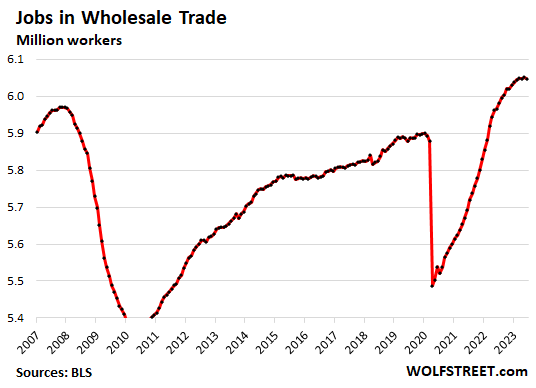
Arts, Entertainment, and Recreation, a small sector that includes employees at facilities for spectator sports, performing arts, amusement, gambling, recreation, museums, historical sites, and similar. Many of these venues had been shut down during the pandemic. But now Americans are flocking to them to splurge on “experiences.” After the huge layoffs during the pandemic, hiring has been trying to catch up, but employment is still not back where it had been before the pandemic:
- Total employment: 2.45 million
- June, month-to-month: 15,600
- Three-month: -+26,100
- Six-month: +56,400
- Growth since Feb 2020: -39,000
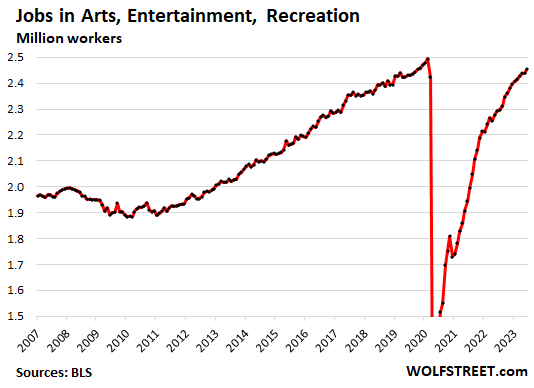
Enjoy reading WOLF STREET and want to support it? You can donate. I appreciate it immensely. Click on the mug to find out how:
![]()


My new neighbor has a job that didn’t exist when I was in college: automation engineer.
Given the flat rate of manufacturing jobs despite the massive new investment in the sector (per Wolf’s article of a couple days ago), that is a great field to be in.
just another fancy name for QC/QA of MRP/ERP system
I put so many ERP systems in for Y2K – great time to be contractor
use of RFID/other smart systems is now norm
but a computer is no smarter than programmer who made it
and of course it terminates when you shut off power
Are you positive its industrial automation and not automation in software?
Yes.
@Ethan in NoVA,
It could be either, both are good fields to be in. At my company we have a manufacturing floor with huge injection molding machines. These machines are controlled by programmable logic controllers (PLCs). We have automation engineers constantly supporting and reconfiguring machines. I also am working with an electronic assembly manufacturing and testing facility. They supply circuit board assemblies to our company. I work with their software guys, they work with “Lab View”, “Visual Basic” and all kinds of other scripting languages. That particular company is based in Michigan, they are going to replace a company in Tijuana Mexico that we have been using. So there is some re-shoring going on… there is still some off-shoring going on.
@drg1234,
“My new neighbor has a job that didn’t exist when I was in college: automation engineer.”
I know exactly what you are talking about. I’ve been in the electronics/embedded systems field since 1984. The evolution has been crazy!
Lets take an example of a petrochemical plant:
1. The Automation Engineer for all electronic sensors and controllers is an ” Instrumentation Engineer”.
2. The Automation Engineer for mechanical equipment like compressors, pumps etc is a “Mechanical Engineering”.
3. The Automation Engineer for electrical equipment like motors and generators is an “Electrical Engineering”.
4. The Automation Engineer for Engineering softwares used is a “Software Engineering”.
5. The Automation Engineer for chemical process in a chemical reactor or distillation tower is a “Chemical Engineering”.
So “Automation Engineer” is probably a made up word by a company that overhired executives. Now these executives need to have reports to prevent getting fired, but with decreasing revenues, the only way they can convince board to hire new folks is by giving them a (fake) noble purpose: Reduce costs by Automation, hence the name! Lol
Leo,
“So “Automation Engineer” is probably a made up word by a company that…”
🤣 Google it!
There are a gazillion references and sites that explain what it is. It’s even in Wikipedia: “Automation engineers are experts who have the knowledge and ability to design, create, develop and manage machines and systems, for example, factory automation, process automation and warehouse automation.”
Comparably.com which compares salaries and employers across the spectrum, says this: “The average Automation Engineer in the US makes $96,485. The average bonus for an Automation Engineer is $5,483 which represents 6% of their salary, with 58% of people reporting that they receive a bonus each year. Automation Engineers make the most in San Francisco at $118,337, averaging total compensation 23% greater than the US average.”
Wolf, the salaries that you mentioned are too low to be core engineering salaries!
While I am not a career counselor, I would recommend my kids to stick to core engineering that I mentioned above or core software engineering if they really like automation and avoid trying “Automation Engineering”.
I would also advice them to go deep and develop a niche knowledge in one of their areas of interest. Good engineering will always be in demand, even despite all AI hype.
Yes, Automation Engineer has a vague description on Wikipedia. So are many NFTs and Cryptos. Are they really valuable?
with salary you quote
it’s IT CIO
but so many are educated idiots
meaning they can’t program themselves out of basket case they are
Leo, in the chemical plant industry, the engineer that works on new and existing chemical processes (products being made for sale) is generally called or referred to as a “Process Engineer” and will have a ChemE degree, at a minimum. Being in Houston, I know several of them personally (family members).
Yes, that’s what I also said above.
exactly – PROCESS engineers are the automator’s we are speaking about
@Leo,
Go to indeed.com and type in “Automation Engineer”
So it’s a job description or role, it may even be a degree in some colleges (what isn’t).
That by itself doesn’t make it an engineering branch. All the core engineers I pointed above are already contributing as Automation Engineer and if can pick up the relevant job description.
So my point is: It’s better to be a core engineer as that makes you a more productive at Automating things.
Leo, folks with Industrial Engineering degrees work as Process, Manufacturing, Automation, Quality, Systems, Supply Chain/Logistics, and many other types of Engineers. There are job postings for Industrial Engineers but it’s much more common and useful to avoid such broad terms. Just because you aren’t familiar with some of them doesn’t mean they’re worthless- as Wolf mentions I don’t think companies would pay these people if that were the case.
Ben, I am very familiar with Engineering and very familiar with Automation. Hence my advice to my kids as given above.
If someone really aspires to work on Automation, I would advise them to get a core engineering degree and work as a Software engineer. It’s lot better than the degree of “Automation Engineer”.
Automation engineers and Process engineers have core engineering degrees in electronics, electrical, mechanical or chemistry. Most require computer science minors at a minimum. They will take certifications to acquire the name Automation or Process engineer. It’s a growing avenue for individuals that love to multitask in fast pace work environments. Lots of great engineering schools are embracing the change, but are keeping with core math, physics, electrical, and chemical classes.
These charts show that the GFC and Covid episodes delivered profound economic and social shocks. Both led to huge policy responses by the Fed that in the aggregate rivaled the monetary response to World War II. Maybe so much money and instability have been created since 2008 that it really is different this time, both economically and socially.
The problem is that we didn’t create wealth. We just created money printing and debt. Productivity is not better.
well to increase productivity a company lays off lots of workers
and keeps producing same amount of widgets
Not just that: chatGPT reportedly estimated that July 2025 will be the date we have artificial general intelligence which will be smarter than we are, and its intelligence will keep doubling from then every few months. Embodied AI will eventually take over cooking, driving, delivery, elder care, and other jobs.
It will be a world like a sci fi novel soon, which will profoundly change our economy. We are on the slopes of the singularity. The USA will be the center of this, because of the chip and manufacturing restrictions on the CCP.
“chatGPT reportedly estimated that July 2025 will be the date we have artificial general intelligence which will be smarter than we are,…”
🤣 Like I said before, chatGPT is very good at generating “fluent bullshit,” and this line is incontrovertible proof.
I am not so negative despite current AIs’ admittedly having “hallucinations.” The big defect with current, major AIs (other than narrow ones, e.g., for driving) is that they are like brilliant 2 year olds, who have gotten all their knowledge of the world from cartoons and believe nonsense. This is because they are trained from an internet filed with nonsense: GIGO.
However, MIT has articles about upcoming, liquid neural networks, which will continue to learn even after they are created (“trained”) in supercomputers — getting feedback on the job, effectively. Getting burned or getting rewarded for correct beliefs about their world is how children learn, and so will AIs.
Intelligence may be an emergent property of sufficient neural connections, and AIs are getting such doubled at increasing speed. As Vice reported, increasingly, even AI experts can no longer explain how AIs work. They will be like children, but their intelligence will double every few months, not even every few years, with quantum computers and narrow AIs later acting effectively as their “unconscious:” in part, like most people’s right, brain hemispheres.
Socioeconomic cataclysm has always been the order of the day here in America, yeah? When was the last time everything was greased and quiet?
Never, of course.
There was relative social peace mid 20th-century, but plenty of live bodies were being exported into harm’s way. There’s always a gradient with max risk and loss exposure.
Usually when large numbers of men are kept busy killing people, but of course that brings other problems …
Of course, that’s looking at the trees and not the forrest.
I don’t know if that shows up in the overall numbers. :)
bulfinch correctly state: “Socioeconomic cataclysm has ALWAYS been the order of the day here in America …”
+1000
Interesting tragectory charts. The scariest is the Jobs in State and Local Government chart while lagging a bit, its tragectory is very steep indeed. Scary as in “I’m from the Government and I’m here to help”.
Yeah, do we really need more of that?
my son works for our city water which should have 5,000 employees
since he is implementing new ERP system he has been writing lots of reports for directors
he now has weekly shortage report – they have over 600 open positions
That State and Local Government chart also includes Education where there are lots of financial troubles. Education financial troubles are worse for private colleges, but public colleges also have a slump in student enrollments that will not let up for the near-term foreseeable future. Population demographics are simply not looking good for American colleges. On top of that, American colleges have lost a lot of foreign prestige and many foreign population demographics are poised to also decline. American colleges, public and private, should plan for falling enrollments for decades. The most prestigious colleges should be fine.
Alan Collinge of studentloanjustice.org is advocating bankruptcy protection for student loans. In addition…
“We urge our 1.4 million members- and student loan borrowers everywhere- to defer, forbear, or otherwise withhold payment”
I think it is safe to say this situation will not increase “the wealth effect”.
Yes, let them claim bankruptcy and only have 7 years afterward to clean up their credit. Then maybe they can get a CC or even a mortgage. In the meantime, they can live in Mom’s basement.
What, you want to go back to earlier times’ hardships and life expectancies? There are worse things than some smoothly distributed inefficiencies.
Imposter,
Read what it says before posting these silly one-liner theories.
Most of these employees are teachers, profs, and other education employees across the spectrum of public education, primary and secondary schools, state colleges and universities, junior colleges, trade schools, etc. There are still rampant teacher shortages in many places.
For example, the Los Angeles Unified School district (served 565,000 students) had 74,000 employees in 2022/23. Those are “local government employees.”
The bloat is in federal government (understatement). We could easily eliminate at least half of the the feds and would never notice other than the country’s finances would be much better off.
Imposter – one might think the attractiveness of a long-term, remunerative, pensioned job is where you find one-much less likely in the private sector these days than in years past (…perhaps the current labor trends presage a mitigation or reversal of the social wreckage-rate-and-wake of ‘corporate business efficiency’ of recent times. Perhaps not…).
Risk to a society lies beyond next quarter’s financials (private AND public sectors…).
may we all find a better day.
From a worker’s perspective, there’s no incentive to increase productivity, quite the opposite. I am not included in profit sharing, simply a hired hand that can be severed at any time. Can’t afford a lifestyle comparable to my parents. Can’t/won’t raise children.
Why bother with a career? I barely survive off my job, all the wealth has been captured by the old generations and the rich. No hope for us, and no interest in this crony capitalism.
Gabe,
Your comment makes me sad. There are lots of younger people that are doing extremely well. They’re making money that we older people couldn’t even dream of. Median Meta employee now makes $300k. These are GenZers and Millennials. Similar at other big tech companies. Industrial companies are paying very well too for the right talent.
What strikes me about your comment and what makes me sad — maybe I’m misreading it — is the “why bother” tone. If you’re not scrambling to improve your knowledge and skills and try very hard to do the best job you can, you may well end up at the “why bother” stage, which is a dead-end. And then blame older people for your own “why bother” attitude? Blaming others (i.e. older people) is so much more convenient than working forever hard on improving your skills and knowledge, and working hard at every job you have.
Well said
+1
While I am not arguing with the “attitude” part, I can’t agree with using Meta as an example: you stated yourself that “Information” is a small sector. And even there a lot of jobs that won’t ever pay even 100K, attitude or not. “Polishing apples” example seems to fit Gabe’s message better :)
The problem is the extent to which Gabe’s circumstance and attitudes are representative of his demographic — if it’s a small number, that’s one thing; if the number is large enough, it becomes politically explosive …
Gabe
“all the wealth has been captured by the old generations and the rich”
It has always been that way. The old have the money because it takes a long time for most people to pay for a house, create significant savings, and earn a retirement.
If you want more money, struggle for it…
But, for me there have always been other things more important. Like health, freedom, and self- respect.
But now that I am retired, I do enjoy the hobby of trading and taking money from Wall Street…
Don’t get too cocky about taking money from Wall Street. Markets can make you humble.
Old School
“Don’t get too cocky about taking money from Wall Street. Markets can make you humble.”
Humble is the key. I was scared to death in January of 22 when I went short. It worked very well. It was my best year ever but it was very worrying going against group opinion. But as Warren Buffett says you have to be bearish when others are bullish.
Now all I see is inflation for as far as the eye can see so I am building position that will benefit from that. I don’t see anybody else here talking about that.
What are you in?
Gabe,
I lot of people are way underpaid for the work that they do. The only reason they continue to work in these jobs is the satisfaction they get for performing a service that the public, the customer, or the country needs. Military people sign up for that very reason. We are in somewhat the same boat you are. A lot of other people are as well. If I took out the overhead and expenses, we are making less than $20/hour for the service of providing Veterans the ability to buy a home. We have to deal with the corrupt Real Estate industry and banking industry. We worked right through the pandemic 18 hours/day. We continue to provide services to the Veterans, It’s not all about the money. If it were, we would have quit a long time ago. You need to look inward and find a way to get out of the job trap that you are in, and stop blaming others for your plight.
We older people worked our butts off for what we have. Quit reading propaganda rags like Business Insider that attempt to divide us generationally. I’m sick of it. We had to work very hard for everything we have. We have had a lot more time on this planet to accumulate wealth. You young people expect to have everything right out of high school. I thought the same way you do until finally, now that I’m old, I’ve built up some wealth. It took decades.
Fed/Gabe – just remember that mileages case-to-case, can be highly-variable…
may we all find a better day.
Thomas, Fed Up, Swamp Creature,
The 1% owns exponentially more and the middle class has shrunk significantly over the decades, it’s not even comparable. Housing affordability back then? Give me a break. He mentioned that he can barely survive off a job- none of you had that issue as a young adult because you could work fast food and buy a house. Not to mention different people are born into different circumstances (ex. not everyone is born an able-bodied white male with 2 successful and healthy parents, which isn’t necessary but sure makes life easier in the US). Bad attitude, sure, but writing off his strife shows ignorance and lack of empathy.
Absolutely agree. I am currently helping a couple who’ve had everything against them from a very young age. They are trying so damn hard, trying to upgrade skills while living in a tent! They are drug and alcohol free. They were able to pull it together and buy a mobile home finally until that was trashed in a hurricane last
year.
They both come from families that are unstable and both of them have complex ptsd from the financial crisis, when their families lost everything to the destroyed mobile home.
They are heroic, imo, as are many of the young working homeless.
“They should just do this, or just do that,” is a brush off that ignores the hardships younger people face today. Things we didn’t face…at all.
Gabe,
Try to stay positive and maybe consider relocating to move toward opportunity. Try not to be a price taker. You only need one good paying job to change your life.
Housing definitely has bubble pricing right now.
Construction employment has received a boost from deflation in construction costs with multifamily construction on fire. When these units are finished, residential rents are sure to decline.
People with 3% mortgages have a strong incentive not to sell, restricting listings. People are moving less for job reasons. How long are the new real estate tycoons going to lose money on empty airbnb units?
Construction will get a big long-term boost from the infrastructure bill
I can’t speak for residential construction, but over in my heavy civil world, costs are rising like crazy. It’s still really difficult to find and keep employees too.
My thought is that there are tons of jobs created in jobs that dont really add much value and will soon be gone. The US economy got a massive infusion of monetary stimulus and so businesses went out and hired people for all types of jobs that are superflous, because times were flush with cash. As the government largesse passes away and bubbles around the globe pop, alot of these workers will be let go, because they dont really do anything meaningful.
Finance and insurance is the perfect example of an industry that is going to be hit very hard by the coming economic crash.
Most of the recent gain in jobs has been in government jobs and health care. While I have a lot of respect for health care workers who are underpaid and provide a necessary service which they should be proud of, the same cannot be said of the government jobs. First of all, many of the government agencies should be eliminated, not cut, I mean zeroed out as David Stockman used to say. The workers may be working hard, but they’re not providing any service that could not be performed more efficiently in the private sector.
“there are tons of jobs created in jobs that dont really add much value and will soon be gone. ”
In a nutshell.
Oh boy I really need another Canada housing bubble article!
I am interested in the Canadian market too.
I read yesterday that the market in Toronto in june is dead.
I also saw that the deals in Montreal for June were minus 10% year-over-year
So which is better:
To go into engineering and make, what, maybe a couple of hundred thousand after some years. (and yes, you may move into mgmt after a while, but there’s little opportunity, (save luck in stock options) to make enormous amounts of money.
or
To go into finance with the potential to make ten times that amount if you’re good, with the opportunity for vast wealth given talent and luck.
My limited experience and knowledge
I always like engineering being an engineer.
All things around us have been built by engineers of various kind.
Finance and economist .. I dont have absolutely any respect for these guys
These guys are just leeches.
“To go into finance with the potential to make ten times that amount if you’re good, with the opportunity for vast wealth given talent and luck.”
Operative word here is “if” (you are good). If not, then you are out on the street or just counting beans until AI does it for you.
Engineers make things…just look around….everywhere. I am an engineer and did well, well enough to retire and have a couple of paid for houses and a good nest egg. No pension, though, except for SS. I’m proud of my career and efforts to get to where we are.
Gah — what a dreary fork in a limited career path.
In the 1974 film Les Valseuses, a young woman played by Isabelle Huppert runs off from her parents to be with two drifters, lobbing a slew of of epithets at her parents as she departs — the most scathing of which she reserves for her gerbil of a father: “engineer!”
I suggest this: let the only injunction to do anything in life be to do it really f’ing well. This, rather than for the recognition or remuneration or whatever other propaganda.
At least that’s what I’ve come up with after spending the last three years off/on doing work in ICUs across the country.
My former middle school could not find a math teacher. The brilliant idea was to scan incoming applications for a person who had taken a college math class the most recently. A recent education grad who was hoping to teach English was convinced to be a team player and accept the math position. Disaster… Biggest problem was dealing with behavior issues while teaching a new subject.
I was a math major and could not get a job teaching math to first graders. They don’t care about your skill set, they only care about “education” course work in teaching. That’s why there is shortage of math and science teachers in the “education” industry.
Been seeing some mentions regarding high salaries in tech. I keep tabs on job postings from last year and this year. Salaries for new hires are plummeting.
Google, Senior developer position (posted one week ago on LinkedIn):
$139,000/yr – $208,000/yr
Meta for similar position:
$133,000/yr – $183,000/yr · Full-time
These used to pay much more, at least twice in terms of Total Compensation. The remaining staff with higher salaries are vulnerable, and many are being watched to show up at the office or else. And this:
“If hired, employees will be in an “at-will position” and the Company reserves the right to modify base salary (as well as any other discretionary payment or compensation program) at any time, including for reasons related to individual performance, Company or individual department/team performance, and market factors.”
The wage growth story should be interesting going forward. The trend seems to be to fire high-salaried employees and hire them back as contractors.
The length of contracts are also plummeting from a minimum of 6 months to 3 months or less. The interview process is longer than the contracts in some cases. Crazy.